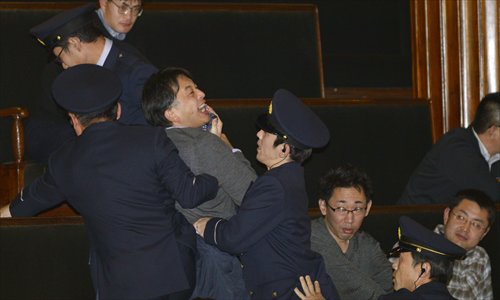HOME >> WORLD
Japan’s lower house passes controversial secrecy bill
Source:AFP Published: 2013-11-27 0:53:01

A spectator is taken out by security personnel as he shouts against lawmakers after they just voted on the controversial state secrecy bill in the lower house of the Japanese parliament in Tokyo on Tuesday. Japan's government is seeking to broaden the definition of state secrets protected by law. Photo: CFP
Japan's lower house of parliament passed a controversial new state secrets bill Tuesday, which critics say is draconian and will impinge on press freedom and the public's right to know.
After a morning of debate, the ruling bloc with support from one opposition party voted for the bill, which would give Tokyo far broader powers in deciding what constitutes a state secret, and severely punish those who leak the information.
The legislation was sent to the upper house for more debate.
That chamber is also controlled by the ruling bloc, which is trying to enact it by the end of the current Diet session on December 6 with approvals from both chambers.
"This is a law that would ensure safety of the Japanese people," Prime Minister Shinzo Abe told reporters after the bill's passage through the lower house.
"Through debates at the upper house, I will do my utmost to ease concerns that the public may have."
The hawkish premier insisted that the bill would neither restrict freedom of the press nor encourage authorities to "arbitrarily" designate information as restricted.
"Frankly speaking, there is misunderstanding," Abe said earlier in the day. "I want to firmly say that it is obvious that normal reporting activity of journalists must not be a subject for punishment under the bill."
Abe's ruling coalition has argued that the legislation is crucial for Japan to enhance its national defence, despite growing concerns among major opposition parties and the public.
Thousands of demonstrators have hit the streets to register their anger at the bill, which comes amid worldwide debate over government secrecy after the Edward Snowden affair.
Under the proposals, information related to defence, diplomacy, counter-intelligence and counter-terrorism can all be classified as a state secret, at the behest of politicians.
Critics argue that the bill could mean far more information being kept from the public, with little real oversight.
AFP
Posted in: Asia-Pacific